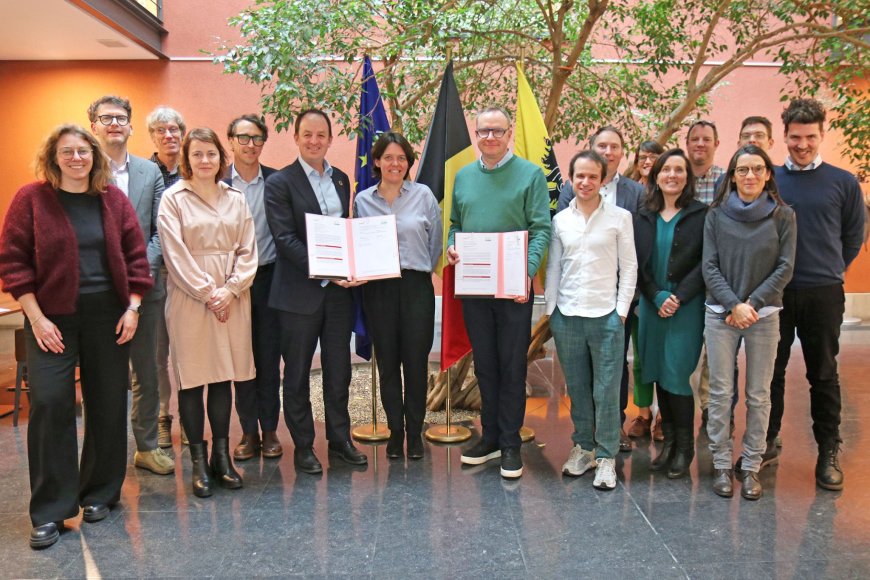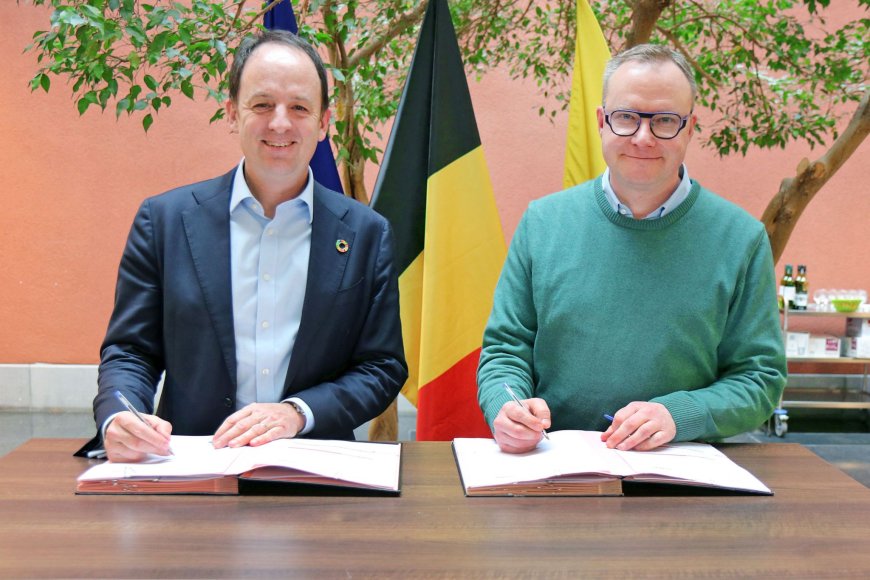Enabel and OVAM Join Forces to Boost Circular Economy in Morocco Brussels, 10 February 2025
Enabel and OVAM collaborate on the Morocco Circulair project, funded by Flanders, to promote circular economy, green jobs, and youth empowerment in Morocco. €5M invested over 4 years.

Brussels, 10 February 2025 – In a landmark collaboration aimed at transforming economic practices in Morocco, Enabel, the Belgian development agency, and the Flemish Public Waste Agency (OVAM) have officially signed a cooperation agreement to launch the Morocco Circular project. This initiative, underpinned by a €5 million investment from the Flemish Government, seeks to enhance the circular economy in Morocco while creating green jobs, particularly for youth and women.
The Vision Behind Morocco Circular.

The Morocco Circular project is designed to support Morocco's transition from a traditional linear economy—characterized by a 'take, make, dispose' model—to a more sustainable circular economy. This innovative approach not only promotes resource efficiency but also aims to reduce waste and foster sustainable practices across various sectors.
The project will focus on several core objectives, including the establishment of technical support mechanisms, youth empowerment through education, the development of regional circular economy hubs, and the acceleration of impact through proactive investment strategies.
Key Objectives of the Project.
Technical Support:
The project intends to provide Morocco with valuable technical expertise to facilitate its transition towards a circular economy. This support will help address challenges such as waste management, recycling processes, and sustainable resource usage.
Youth Empowerment:
A significant component of the initiative is aimed at educating and empowering young people, especially girls. OVAM will offer short-term technical training programs tailored to complement Morocco's vocational training offerings, enhancing the skill sets of youth and preparing them for careers in the green economy.
Regional Hubs:
Drawing inspiration from Flanders' successful models, the project will establish circular economy hubs across Morocco. These hubs will serve as innovation centers where businesses, local governments, and communities can collaborate to develop and implement circular economy practices.
Accelerating Impact:
A critical element of the project will involve guiding high-potential projects to connect with investors. By linking innovative initiatives with funding sources, the project aims to maximize social and economic benefits, driving sustainable development in Morocco.
Inspiration from Vlaanderen Circulair.
Morocco Circular is closely aligned with the Vlaanderen Circulair partnership, which successfully integrates government entities, businesses, civil society, and academic institutions in Flanders to drive circular economy initiatives. This proven model will provide a roadmap for Moroccan stakeholders to follow, enabling effective collaboration and resource sharing.
Furthermore, the Flemish Institute for Technological Research (VITO) will contribute its expertise to the project, ensuring that Morocco has access to cutting-edge research and technological advancements necessary for a successful transition.
Statements from Project Leaders
Jean Van Wetter, CEO of Enabel, expressed enthusiasm about the partnership, stating, “Enabel is thrilled to collaborate with OVAM, thanks to Flemish funding. OVAM’s technical know-how in waste processing and the circular economy is among the best in the world, making this partnership a valuable addition to our expertise.”
Werner Annaert, Administrator General of OVAM, highlighted the significance of the collaboration: “Flanders’ expertise in waste prevention, recycling, and the circular economy is internationally recognized. This collaboration not only creates economic and social opportunities but also enriches our own knowledge and insights.”
Project Context and Strategic Partnership
The Morocco Circulair initiative is a key component of the Strategic Partnership 2024-2028 between Flanders and Morocco, developed in collaboration with the Moroccan Ministry for Energy Transition and Sustainable Development (MTEDD) and the Ministry of Economic Affairs and Finance. Over the next four years, the project will actively work to implement its objectives, with a commitment from the Flemish Government to invest €5 million in its success.
This initiative underscores Flanders’ commitment to sharing its circular economy expertise on a global scale. By working closely with Moroccan partners, the project aims not only to enhance economic resilience in the region but also to empower local communities and promote sustainable development practices.
Conclusion
The collaboration between Enabel and OVAM through the Morocco Circular project represents a significant step towards promoting a circular economy in Morocco. By focusing on youth empowerment, technical support, and innovative hubs, this initiative has the potential to create sustainable economic opportunities while addressing pressing environmental challenges. As the project unfolds, it promises to set a benchmark for collaborative international efforts aimed at achieving a sustainable and circular future.
 Kinyarwanda
Kinyarwanda
 English
English









































































